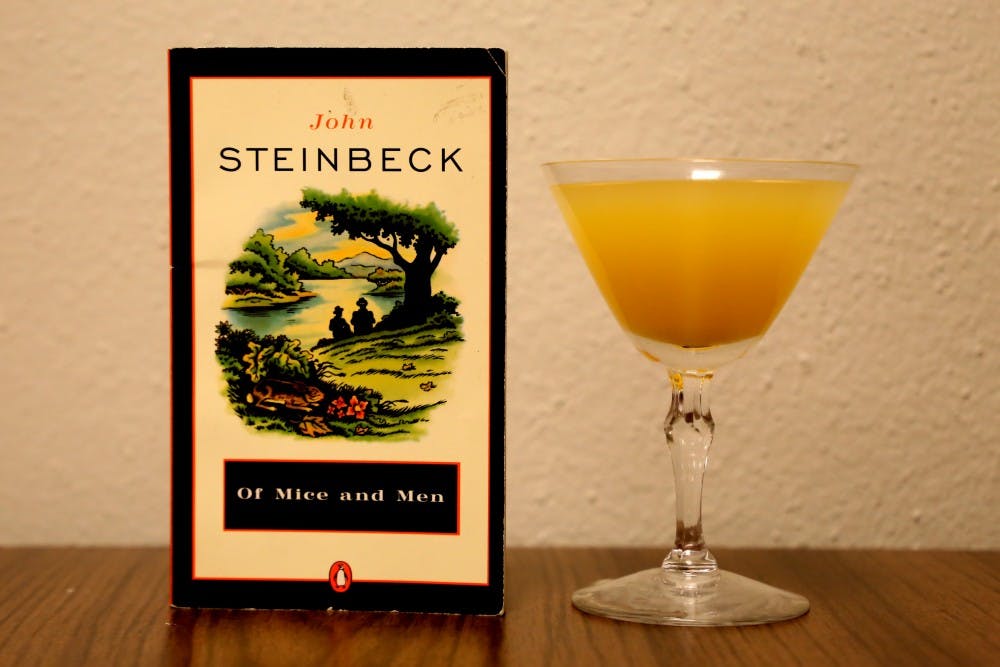Each week reporter Carson Abernethy drinks his way through great works of literature, reviewing books and the booze that inspired them.
"Of Mice and Men" is one of John Steinbeck's best known works, recounting the friendship between two migrant farm workers, their search for employment amidst the desolation of the Great Depression and how their dreams are compromised by reality.
This novella, like many of its time, deals with the bitter realities of the American Dream, and how such dreams can never be fulfilled on this side of paradise.
While "Of Mice and Men" is not as nearly as great a work as "The Grapes of Wrath" or to a lesser extent "East of Eden," it still presents many of the themes those books grapple with but in a format that can be digested in a single afternoon.
The Ward 8 is a cocktail that has been somewhat lost to time. It was created in the 1890s, popular during prohibition, and then somehow lost its way. It's a subtle, unfettered kind of drink, modest and vaguely naive, but still packs a punch — a lot like Lennie does in the novel.
Recipe
2 oz. rye whiskey
3/4 oz. lemon juice
3/4 oz. orange juice
1 teaspoon grenadine
Shake ingredients together well and strain into a cocktail glass.
Prose: 3/5
Steinbeck manages to mimic the natural speech patterns and vernacular of poor, uneducated workers very effectively. While his prose in "Of Mice and Men" never soars to the heights that someone like Faulkner's does, it also has a brevity and simplicity, for good or for bad, that makes it a very clear and direct read. You won't find huge, run-on sentences detailing the minutiae of a character's thought processes here. Although they write about similar people with a similar tone, Steinbeck's is in a more palatable package then Faulkner's. This book deals with situations of a lot of emotional weight, but it is written in a way anyone can understand.
Characterization: 4/5
Steinbeck paints two characters with great precision, and they are perfect foils for each other. George is sensible, intelligent but uneducated, who serves as the protector or guardian of Lennie, who is developmentally disabled, innocent and extremely strong, but unaware of his own strength. Steinbeck employs the powerful imagery of Lennie killing small animals he was trying to pet, and the novel's climax and conclusion is directly connected to this unwitting strength. Lennie in particular is imbued with a lot of pathos, and the novel's ending really cements his role as a tragic figure. Other complex characters like Curley's wife become entangled with Lennie and George for dramatic and dire effects.
Cohesiveness: 4/5
The novel itself has a rather simplistic structure, as it climaxes and then falls into the denouement. As a shorter work it fits rather well, if unspectacularly, as a whole. Although it is short, it still conveys a lot of meaning with the time it has. Part of what makes it so effective is the ease of its structure that just flows from scene to scene.
Relevance: 3/5
The novel depicts a time in U.S. history when the country had stagnated culturally and economically, and some would characterize the last 10 years in much the same way. Whether or not we use words like depression or recession, the novel still reminds us of pertinent things like the frailty of dreaming and the importance of fraternity. Still, many of the facets of the novel are dated. The depiction of Lennie's mental illness is a bit unseemly, reflecting a very outdated understanding of mental illness; Curley's wife symbolizes the notion the book seemingly espouses that women are corrupting influences, seductresses who cause all of the problems in the book, and who seemingly have little role in the utopia of male friendship that is dreamed up in the novel.
Overall: 3.5/5
"Of Mice and Men" sacrifices the complexity of later works for an easily accessible conciseness. Steinbeck himself occupies a curious place in literary history; not as great as a Kafka, Proust, or Lawrence, but his work is more common. Perhaps something can be said for the lesser artist with greater appeal. I'd be hard-pressed to find someone who has read "In Search of Lost Time," but just about everyone has read "Of Mice and Men" or "The Grapes of Wrath." Steinbeck has become inextricably linked with the America he described, and few can match his balance of approachability and depth.
Related links:
Books & Booze: 'Lolita' by Vladimir Nabokov
Books & Booze: 'The Sun Also Rises' by Ernest Hemingway
Reach the reporter at cabernet@asu.edu or follow @carson_ab on Twitter.
Like The State Press on Facebook and follow @statepress on Twitter.




